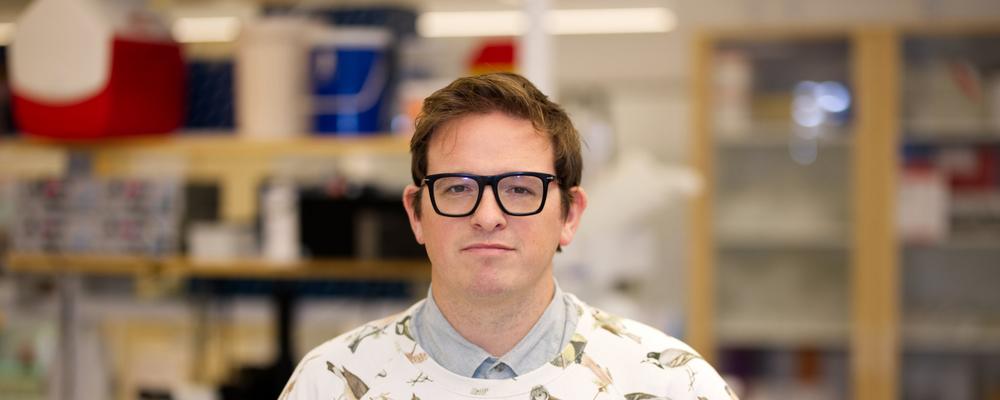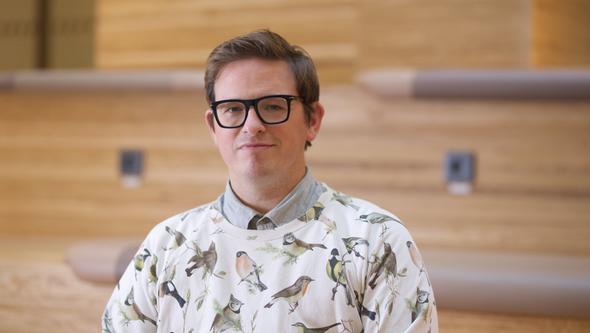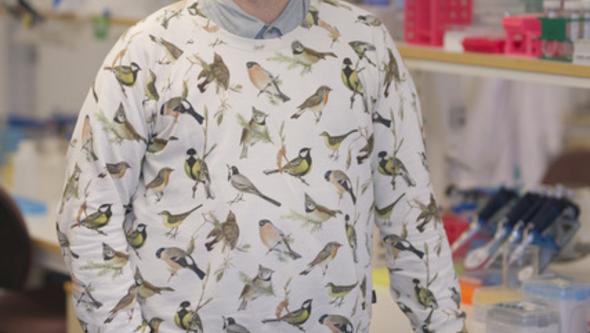
- Home
- Research
- Find research
- George Birchenough studies interactions between microbes and mucus-secreting cells
George Birchenough studies interactions between microbes and mucus-secreting cells
We study how mucus and mucus-secreting goblet cells control our interactions with microbial organisms, and if alterations in those interactions can cause disease.
What is your scientific background?
My life in research really started during my MSc training in Medical Microbiology at the London School of Hygiene & Tropical Medicine. Here I was introduced to and became fascinated by the mechanisms of microbial pathogenesis, in other words how various viral, bacterial and fungal organisms interact with and in some cases overcome the systems that much larger multicellular organisms have evolved to protect themselves. I went on to undertake a PhD project at University College London examining the infection mechanism of Neonatal Meningitis associated Escherichia coli (NMEC), a subset of bacteria that are a major cause of brain inflammation in very young and preterm infants, but that do not cause disease in older children or adults. NMEC initially invades its host via the intestine, and we reasoned that the basis for this age-dependency would be because of the developmental state of the host’s protective systems. This turned out to be correct, but not for the reasons we initially suspected. Surprisingly, we found that the basis of NMEC infection resistance was the postnatal development of the mucus barrier in the small intestine.
This discovery was made in collaboration with Gunnar Hansson’s Mucin Biology Group at University of Gothenburg, and after my PhD was completed, Gunnar offered me a postdoctoral position at GU and so I came to Sweden to continue my research. Here my work became much more focused on the host side of the host-microbe relationship, and I worked on the protective functions of specific mucus proteins and how mucus protective systems develop in the early stages of life. My most productive project resulted in the discovery of a novel sub-type of mucus secreting goblet cell, now designated “sentinel goblet cells” or “senGCs”. These cells sample and sense the microbial environment in the distal colon and orchestrate mucus secretion in response to bacteria that have penetrated through the protective mucus barrier. At the time, goblet cells were considered as a homogenous and unifunctional cell type, so this was cool discovery. In my own lab, the themes of goblet cell functional diversity, infection and general host-microbe interactions really underpin all our ongoing work.

What are the big scientific questions you are working with? Is there a vision for your research group?
Ultimately my goal is to understand how our bodies mucosal surfaces interact with microbes and how these interactions are altered to drive disease. Supposedly, 2000 years ago Hippocrates stated that “all disease begins in the gut”. While this is of course not entirely accurate, there is a great deal of truth to this statement, and I think it is quite safe to say that the majority of diseases we face today originate from interactions between our environment and our bodies mucosal surfaces, of which the gut and lungs are the major components. All of our mucosal surfaces perform life-critical functions that require exposure of living cells (i.e. unlike our skin) to an environment that is heavily colonized by microbes, especially in the gut. Controlling interactions between these microbes and our own tissues is critical to our health and has driven the evolution of multiple protective systems one of which is mucus secreted by goblet cells. In the gut mucus forms a barrier that physically prevents microbial interactions with our tissues, while at the same time providing a habitat and nutrient source to elements of the microbial community that in turn can compete with pathogens that might try to infect us. In pre-industrial communities our major problem was dealing with such pathogens; however, in post-industrial communities we now see that, significant changes in our lifestyle (e.g. diet) have caused pathological alterations in our relationship with microbes that are normally beneficial to us. Such alterations in the host-microbe balance are increasingly associated with non-communicable diseases such as inflammatory bowel disease, type 2 diabetes and colorectal cancer that have become increasing problems in modern society. I believe that understanding the basis of these maladapted interactions will allow us tune dietary, prophylactic and therapeutic interventions to help us to prevent such diseases, and that is the vision for my research team.

Why did you start with research?
I would love to be able to say that science has always been my passion, but this would not be true. My path to a research career has involved a lot of chance decisions and random events that could quite easily led in different directions. I come from a family of laywers, writers and artists, so had no exposure to medicine or science as a career path growing up, but I was always interested in biology at school, and it was that initial interest that formed the foundation of where I am today. I think that one of the most appealing aspects of science to me is the creative side, which maybe aligns more with my family background. Even if you are not the most gifted chemist or molecular biologist, if you have a strong creative side and a good imagination you will be able to spot opportunities or design experiments that others may miss.
What co-operations do you have today: with other scientific group, with industry, or clinical?
We have many collaborations with basic and clinical researchers, both here at GU and more broadly in Sweden, Europe, the US and Canada. My group is part of the Wallenberg Centre for Molecular & Translational Medicine which has been a great platform for interacting and collaborating with other group leaders at a similar career stage. If I was asked for advice to give to younger researchers, I would strongly suggest seeking out others at an equivalent career stage and joining societies within your field that provide networking opportunities to younger scientists.

Short description of your research for non-academics:
We study how mucus and mucus-secreting goblet cells control our interactions with microbial organsisms, and if alterations in those interactions can cause disease.
- Age: 40 year
- PhD: 2013, University College London
- Post-doc: 2014-2019, University of Gothenburg, Mucin Biology Group (Gunnar C. Hansson)
- Funding: National Institutes of Health (US), Vetenskapsrådet, Cancerfonden, WCMTM, VGR (ALF), Sahlgrenska Akademin
- Awards/Prizes: MIST scholarship in Mucosal Immunity (NIH), Junior Investigator Award (Cancerfonden)